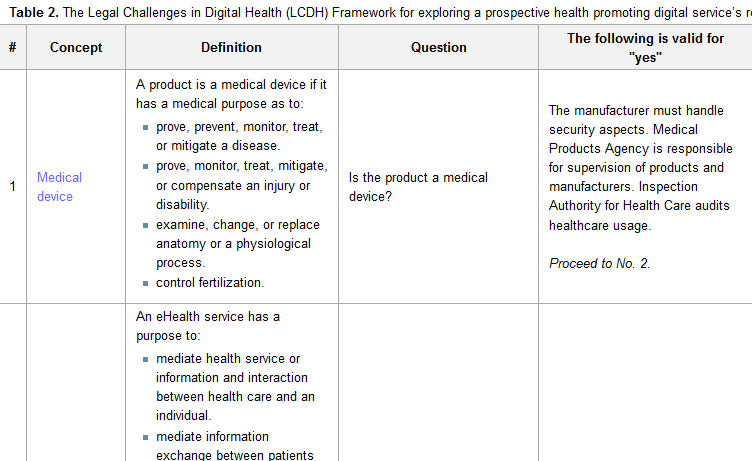Difference between revisions of "Template:Article of the week"
Shawndouglas (talk | contribs) (Updated article of the week text.) |
Shawndouglas (talk | contribs) (Updated article of the week text.) |
||
| Line 1: | Line 1: | ||
<div style="float: left; margin: 0.5em 0.9em 0.4em 0em;">[[File: | <div style="float: left; margin: 0.5em 0.9em 0.4em 0em;">[[File:ALegalFrame1.png|240px]]</div> | ||
'''"[[Journal: | '''"[[Journal:A legal framework to support development and assessment of digital health services|A legal framework to support development and assessment of digital health services]]"''' | ||
Digital health services empower people to track, manage, and improve their own health and quality of life while delivering a more personalized and precise health care, at a lower cost and with higher efficiency and availability. Essential for the use of digital health services is that the treatment of any personal data is compatible with the Patient Data Act, Personal Data Act, and other applicable privacy laws. | |||
The aim of this study was to develop a framework for legal challenges to support designers in development and assessment of digital health services. A purposive sampling, together with snowball recruitment, was used to identify stakeholders and information sources for organizing, extending, and prioritizing the different concepts, actors, and regulations in relation to digital health and health-promoting digital systems. The data were collected through structured interviewing and iteration, and three different cases were used for face validation of the framework. A framework for assessing the legal challenges in developing digital health services (Legal Challenges in Digital Health [LCDH] Framework) was created and consists of six key questions to be used to evaluate a digital health service according to current legislation. ('''[[Journal:A legal framework to support development and assessment of digital health services|Full article...]]''')<br /> | |||
<br /> | <br /> | ||
''Recently featured'': | ''Recently featured'': | ||
: ▪ [[Journal:The GAAIN Entity Mapper: An active-learning system for medical data mapping|The GAAIN Entity Mapper: An active-learning system for medical data mapping]] | |||
: ▪ [[Journal:Visualizing the quality of partially accruing data for use in decision making|Visualizing the quality of partially accruing data for use in decision making]] | : ▪ [[Journal:Visualizing the quality of partially accruing data for use in decision making|Visualizing the quality of partially accruing data for use in decision making]] | ||
: ▪ [[Journal:Digital pathology and anatomic pathology laboratory information system integration to support digital pathology sign-out]] | : ▪ [[Journal:Digital pathology and anatomic pathology laboratory information system integration to support digital pathology sign-out]] | ||
Revision as of 16:32, 1 August 2016
"A legal framework to support development and assessment of digital health services"
Digital health services empower people to track, manage, and improve their own health and quality of life while delivering a more personalized and precise health care, at a lower cost and with higher efficiency and availability. Essential for the use of digital health services is that the treatment of any personal data is compatible with the Patient Data Act, Personal Data Act, and other applicable privacy laws.
The aim of this study was to develop a framework for legal challenges to support designers in development and assessment of digital health services. A purposive sampling, together with snowball recruitment, was used to identify stakeholders and information sources for organizing, extending, and prioritizing the different concepts, actors, and regulations in relation to digital health and health-promoting digital systems. The data were collected through structured interviewing and iteration, and three different cases were used for face validation of the framework. A framework for assessing the legal challenges in developing digital health services (Legal Challenges in Digital Health [LCDH] Framework) was created and consists of six key questions to be used to evaluate a digital health service according to current legislation. (Full article...)
Recently featured:










